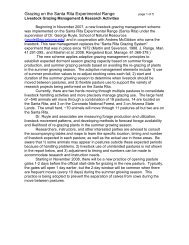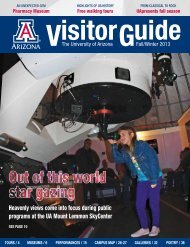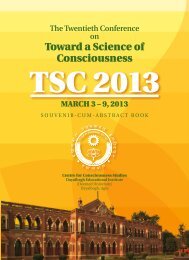CONSCIOUSNESS
Download - Center for Consciousness Studies - University of Arizona
Download - Center for Consciousness Studies - University of Arizona
- No tags were found...
Create successful ePaper yourself
Turn your PDF publications into a flip-book with our unique Google optimized e-Paper software.
1. Philosophy 51<br />
21 Fine-Grained Supervenience Pete Mandik (Philosophy,<br />
William Paterson University, Wayne, NJ)<br />
The philosophical technical term ‘supervenience’ is frequently used in the philosophy<br />
of mind as a concise way of characterizing the core idea of physicalism in a manner that is<br />
neutral with respect to debates between reductive physicalists and nonreductive physicalists.<br />
I argue against this alleged neutrality and side with reductive physicalists. I am especially<br />
interested here in debates between psychoneural reductionists and nonreductive functionalist<br />
physicalists. Central to my arguments will be considerations concerning how best to articulate<br />
the spirit of the idea of supervenience. I argue for a novel version of supervenience, ‘finegrained<br />
supervenience,’ which is the claim that if, at a given time, a single entity instantiates<br />
two distinct mental properties, it must do so in virtue of instantiating two distinct physical<br />
properties. I argue further that despite initial appearances to the contrary, such a construal of<br />
supervenience can be embraced only by reductive physicalists. P7<br />
22 Dualism Without the Usual Problems: An Introduction to Soft-Interactionism<br />
Bernard Molyneux (Philosophy, UC Davis, Woodland, CA)<br />
Dualists have in recent decades presented arguments which, being Cartesian in style, lead<br />
to species of dualism with causal interaction problems. As a result, contemporary dualists usually<br />
endorse epiphenomenalism, the thesis that the conscious mind is causally inefficacious.<br />
In contrast, I present a new dualist position derived from a family of libertarian responses to<br />
the problem of free will, in which non-physical agency has its effect by exploiting the indeterminacy<br />
in physical state evolutions. The resulting interactionist view allows the dualist to<br />
convincingly answer the two principal arguments for physicalism - the causal exclusion argument<br />
and the argument from lack of evidence - while retaining any motivation provided by<br />
Cartesian dissociation, specifically via reformulated zombie arguments. The view is amenable<br />
to a naturalistic development, as it is able to exploit the ontological neutrality of evolutionary<br />
and computational theory. Lastly, the view is open to empirical verification. However, such<br />
an investigation cannot proceed at the level of physics, but requires cross-level observations<br />
taken at the physical and intentional levels. C2<br />
23 Phenomenal Realist Physicalism Implies Coherency of Epiphenomenalist<br />
Meaning William S. Robinson (Iowa State University, Ames, IA)<br />
Recent criticisms of epiphenomenalism include a self-stultification objection, according<br />
to which epiphenomenalism is incoherent, because phenomenal quality words could not mean<br />
what epiphenomenalists say they mean, if epiphenomenalism were true. This paper seeks to<br />
remove the sting of this objection. As many physicalists will agree, phenomenal quality terms<br />
do not simply have the same meaning as neural property terms. If phenomenal realist physicalism<br />
is true, there must be some true theory T, statable in terms acceptable to physicalists,<br />
that explains how such terms come into use. Let epiphenomenalists construct a new theory,<br />
T*, that is exactly like T except that wherever a phenomenal quality is invoked as a cause,<br />
the term for that quality is replaced by the neural property term that physicalists say has an<br />
identical referent. Since causal contexts are extensional, T* will be true if T is; both will be<br />
acceptable to physicalists; and T* will be usable by epiphenomenalists, as it attributes causation<br />
only to properties that they agree are physical. So, if phenomenal realist physicalism is<br />
true, there is a T* that is true and coherently usable by epiphenomenalists. – This argument<br />
bears adversely on an important argument offered by K. Balog. Some arguments she gives to<br />
support her view can be re-targeted as arguments against my conclusion. These arguments are<br />
reviewed and answered. C9<br />
24 A Critique of Jaegwon Kim’s Physicalism: An Implicit Argument for a Non-<br />
Cartesian Interactionism David Scharf (Physics, Maharishi<br />
University of Management, Fairfield, IA)<br />
Kim’s argument for a minimal physicalism breaks down in two critical places. First, his<br />
functional reduction of cognitive/intentional properties fails to do justice to what we mean







